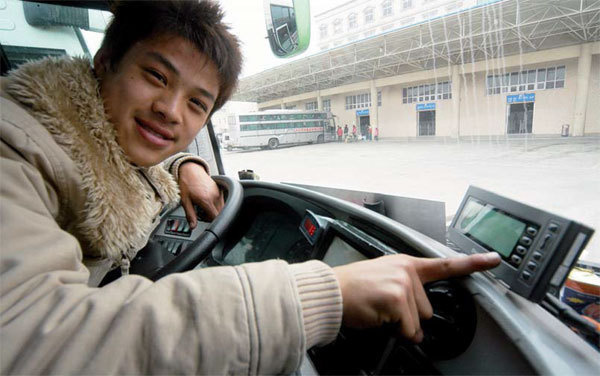'Connected car' rewiring consumer demand
China Daily, October 20, 2014 Adjust font size:
|
|
|
A long-distance bus driver in Bozhou, Anhui province shows his newly installed GPS system. The device can be used not only for navigation, but also for monitoring speed, greatly improving driving safety. [China Daily] |
Connected cars are so desirable in China that demand surpasses even Western auto markets, research company Nielsen found in a recent survey.
"Just as China is leading global smartphone and e-commerce trends, we find that Chinese consumers are also progressive in bringing technology to automobiles," said Pat Gardiner, president of global automotive division at Nielsen.
The company conducted global research to understand market trends around network-wired cars in a range of countries including China.
"The high interest from Chinese consumers demonstrates that China is a unique market for connected cars and will help international automakers understand how to create vehicles consumers want to buy," said Gardiner.
So-called connected cars use telematics that include wireless interfaces with vehicle technologies, road infrastructure, safety devices, networks and navigation hardware.
The survey interviewed 1,100 consumers in 10 Chinese cities who own cars for personal use and are decision-makers in their households.
"We found in the survey that Chinese consumers are much more engaged in the telematics in their cars than other markets. It's incredible," said Gardiner.
He told China Daily that the awareness of connected cars is very high among Chinese consumers, with some 87 percent of interviewees understanding the concept and products, much higher than the 57 percent in the United States.
"This is in large part driven by high adoption of in-car infotainment devices in China," he said.
According to the survey, 42 percent of car owners stated that they have telematics in their cars, and about 94 percent of those use the devices, also much higher than the 67 percent in the US.
Gardiner added telematics technology is an important factor for driving purchase decisions in China, with nearly half of the consumers surveyed rating it as one of the top five features they look for in a car - even before things like automatic steering.
Another highlight of the survey that impressed Gardiner was that famously price-sensitive Chinese consumers are more willing to pay more for connected products and services.
Nielsen found that Chinese consumers are willing to pay on average 590 yuan a year for connected technologies with some even willing to pay more than 1,500 yuan.
That contrasts with US and European consumers that are turned away by the expense of telematics systems, and are less likely to pay premium prices for them, according to Gardiner.
Furthermore, he never expected that more Chinese consumers are willing to pay for the advertise-supported models, four times more than that in the US. "That indicated a more flexible marker for connected cars in China."
Growth opportunities
He said the range of features is opening up growth opportunities for automakers and third-party service providers.
"Nowhere offers such big opportunity as in China. There is momentum for carmakers to capitalize on consumers who are leading the digital effort, and as the data shows, eager to be connected."
To take advantage of the opportunities, Gardiner suggested automakers first understand which aspects of telematics are most valued by consumers.
"It's a misconception that what people want out of connected cars is entertainment. The top 10 Chinese consumer needs when it comes to this aspect are features that enable safer and easier driving experiences," said Gardiner.
The top three on the list include a rearview camera, online navigation system and Bluetooth speakerphone. The need for entertainment doesn't make the list until the 11th position with a DVD system.
"We found that many features are standard but some are unmet and provide an opportunity for someone to differentiate by entering the market with this offering," said Gardiner.
He said the top opportunity that isn't yet adequately satisfied is a smartphone connection, which was No 4 overall on respondent list.
More than half of the people showed a strong desire to have a smartphone capability in their cars, a desire not matched by the supply of existing car designs in China, the largest smartphone user in the world.
"Chinese consumers want this feature because it enables safer and easier driving experiences through things like easier GPS and driver-oriented design to ensure safety," said Gardiner.
Communication and information searches are also compelling features of smartphones, he added. Car owners are looking for a hotspot connection with 3G Wi-Fi in the vehicle, a connection with telematics, and remote start of the car through their smart phones.
The connected car concept was first introduced in General Motors' OnStar systems in 1996, which allowed drivers to communicate with the vehicle and other devices inside and outside the car. Entered China in 2009, OnStar now has more than 780,000 local users.


